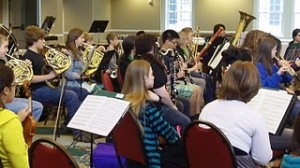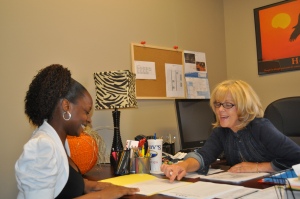By Jen Ingles
aThEENS staff

Tara Gray, a graduate student at UGA's Terry College of Business, shares budgeting tips at the Athens-Clarke County Library. (Photo/ Jen Ingles, jen.stitches@gmail.com)
Others may be uneasy, but not Amanda Smith.
“It’s something that’s not comfortable to talk about,” said Smith, who as president of Live Financially, the University of Georgia’s peer financial counseling group, talks about money frequently.
Smith passed out brochures and welcomed students to Live Financially’s forum on financial literacy for young people on UGA’s campus in February.
Live Financially is a new initiative run by public relations students, like senior Katie Dean Williams, in the Grady College of Journalism and Mass Communication at UGA.
Williams said most people learn about managing money from their parents, which works if your parents are knowledgeable in this area. But for those not so lucky, this lack of information can lead to a cycle of debt difficult to escape.
“If you were in that situation, who do you go to?” Williams said. “What resources do you have to set you up?”
Live Financially reached out to young Athenians throughout the month of February to improve their financial literacy through its presence on the web and events tailored to the needs and tastes of local youth.
At the forum on campus, Williams greeted students as they entered the lecture hall, urging students to fill out pledge cards stating their commitment to taking charge of their financial futures. The pledge cards were used to enter students into a raffle for free prizes from local businesses.
“Problems with money, it’s never an amount problem, it’s a management problem,” said Joan Koonce, a professor in the College of Family and Consumer Sciences at UGA.
Koonce and housing and consumer economics professor Diann Moorman both served as panelists, answering questions about savings accounts, student loans, proper use of credit cards and how to develop a good credit score.
Adelina Simeonova, 19, said she came to the function because it was a blue card event (the University allows underclassmen opportunities to register for classes early if they attend a certain number of blue card events throughout the semester), but said she learned a lot.
“I’m very interested in developing a credit history,” she said.
A discussion held at the Athens-Clarke County public library featured more experts from the University, but was aimed at Athens residents instead of University students.
Williams said Live Financially decided it was important to take its message off campus to the broader Athens community because community members may not have access to the type of resources available to students. She noted also Clarke County’s notoriously high poverty rate. In 2009, 39 percent of Clarke County residents lived in poverty.
The topics discussed at the library event ranged from preparing to buy a home to sticking to a budget.
Panelist and graduate student in the Terry College of Business Tara Gray said she allows for what she calls “sanity money” in her budget. Reigning in spending, she said, does not require the exclusion of all frivolous purchases. She advised guests at the event to plan ahead for the little pleasures they decide to allow themselves.
After conducting research on residents’ financial literacy last fall, Live Financially saw a need to reach out to young people, women in particular. Men and women participating in the study scored the same on knowledge level, but women tended to be less confident about their financial savvy.
The group partnered with boutiques downtown to hold sale events in an effort to engage Athens’ young women.
“We do sales, and that really does help you budget,” Williams said. “If you get 75 percent off a garment instead of paying the full price, it’s the little things that can get you started.”
Although the group found women doubted their knowledge more than men, it also found young people of both genders tended to overestimate their financial knowhow.
“It was really interesting to see how cocky the young population was and how they didn’t know anything,” Williams said.
Williams said she did not start thinking about money and how to manage it until she got her first job the summer after she graduated from high school.
University senior Mamie Cargile, also working on the Live Financially campaign, said she did not begin to consider her finances until college. She said that although her parents still support her financially, she still must make decisions about how to spend her money.
“Am I going to go to Kroger and buy groceries for the week or am I going to eat out?” she said. “As you reach adulthood it becomes more and more important because you’re actually in charge of your finances.”









